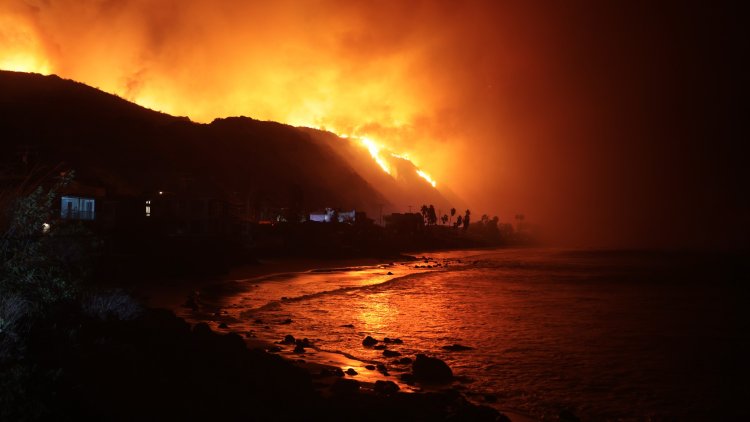‘I’ve Never Seen Anything Like This’
The Palisades Fire is destroying places that I’ve loved.

We knew to expect winds. When they came on Tuesday morning, sounding like a tsunami crashing over my family’s home in western Malibu, the utility company shut off our power. We knew the chance of fire was high.
I had arrived home for the holidays in early December, and had already been greeted by the Franklin Fire, which had burned the hills black. Now, when my dad and I went in search of electricity, a great plume of smoke was rising above those burned hills. It cast out over the Pacific, just as it had during the Woolsey Fire that tore through Malibu in 2018. The way the wind was blowing—rattling our car, scattering palm fronds and tumbleweeds across the road—we knew this new fire would probably hit Topanga Canyon, the mountain community where I grew up. Dad decided we needed to get up there and help our former neighbors. People who have lived in this area for decades, as my family has, can get so used to evacuation warnings that they don’t always follow them.
Yesterday, the fires burning around Los Angeles were frightening; overnight they became a terror. A fire this strong, at this time of year, is unusual, an outlier. But it is also familiar, one in a series of fires that, as a seventh-generation Californian, I’ve lived through, or my family has. It has destroyed places that I’ve loved since childhood; it’s not the first fire that’s done so. To some of our friends and neighbors, this fire seemed manageable—until it didn’t. Today, it is, as one friend said, a hell fire.
On the way to Topanga Canyon, Dad and I stopped to watch the fire burn. The flames were coming into a neighborhood where two of my childhood friends grew up, just beyond the Pacific Palisades where the blaze started. The way the fire was burning, I couldn’t imagine that the Palisades was still standing. The main road was closed—these winds can dislodge rocks and rain them down on cars—so we took back streets. “You can tell people are emotional from the way they’re driving,” Dad said, after someone whipped around a blind turn. We made it to the house of a friend, another old-timer who, like Dad, lived through the 1993 fire, the one that got so close, it warped the double-pane glass in my childhood home. He told us he’d be fine, based on the way the wind was blowing, and offered to make us a pot of coffee while he still had power—he’d heard they’d be shutting it off in the next hour. Dad said it looked like the flames had reached the mouth of Topanga Canyon, and our friend promised he’d get ready to evacuate. “But nothing will ever be as bad as ’93,” he said.
When Dad and I got home, our power was still out. The city had issued evacuation warnings in a nearby neighborhood. Should we get ready? A month before, we’d packed up the family photos and the birth certificates for the Franklin Fire, and our house had been fine. Our Malibu neighbor, who stayed behind during the Woolsey Fire, tends not to worry. But the winds were so strong, she thought this one could be worse than all the others.
That night, Dad and I decided to get back in the car, to see how close the fire was. When we managed to open the front door against the wind, we were coated in a fine layer of dust. The houses around us were dark, all their power out. Driving on the highway this time, instead of smoke, we saw flames.
The friend we’d visited that afternoon called us. “I’m on the freeway now,” he said. “I got the hell out of there. We’re toast. I’ve never seen anything like this.”
From a radio broadcast, cutting in and out, we could hear the gist of the damage so far. “Malibu Feed Bin”—where my family would buy dog food and pet the rabbits—gone. “Topanga Ranch Motel”—the bungalows where I’d wait for the school bus—gone. “Reel Inn”—a seafood restaurant where employees would handwrite ocean puns beneath its neon sign—gone. “Cholada Thai”—a high-school standard where my friends and I still gather—gone. “Wiley’s Bait & Tackle,” a wooden shack opened in 1946, where my brother and I would gross each other out looking at lugworms—gone.
My ancestors came to California before it was even a state; we have lived through decades of Santa Ana winds coming in off the desert and shaking our houses so powerfully, we lose sleep. But my brother and I also used to stand outside our childhood home, our backs to the wind, and toss stones into a nearby canyon, laughing as the Santa Anas carried them farther than we could ever throw. The winds are part of life here, and one that I’ve always, probably foolishly, loved.
Last night, my parents and I kept our phones on in case any emergency notifications came through. This morning, our power was still out. We have loaded the family photos and the birth certificates in the car and are ready to leave if the evacuation notice comes. Even as the fires are still burning, my parents are already talking about how they will handle this all better “next time.” We will get a larger coffee press so that, next time, we can each have two servings when the power goes out. We will get a camp stove so that, next time, when the gas shuts off, we won’t have to boil water on the barbecue.
Mom just told me that her friend sent her some new photographs: My childhood home, which she and my Dad built together in Topanga Canyon, may be gone. For now, the fire is still on the other side of Malibu. The wind is still blowing.
What's Your Reaction?




















